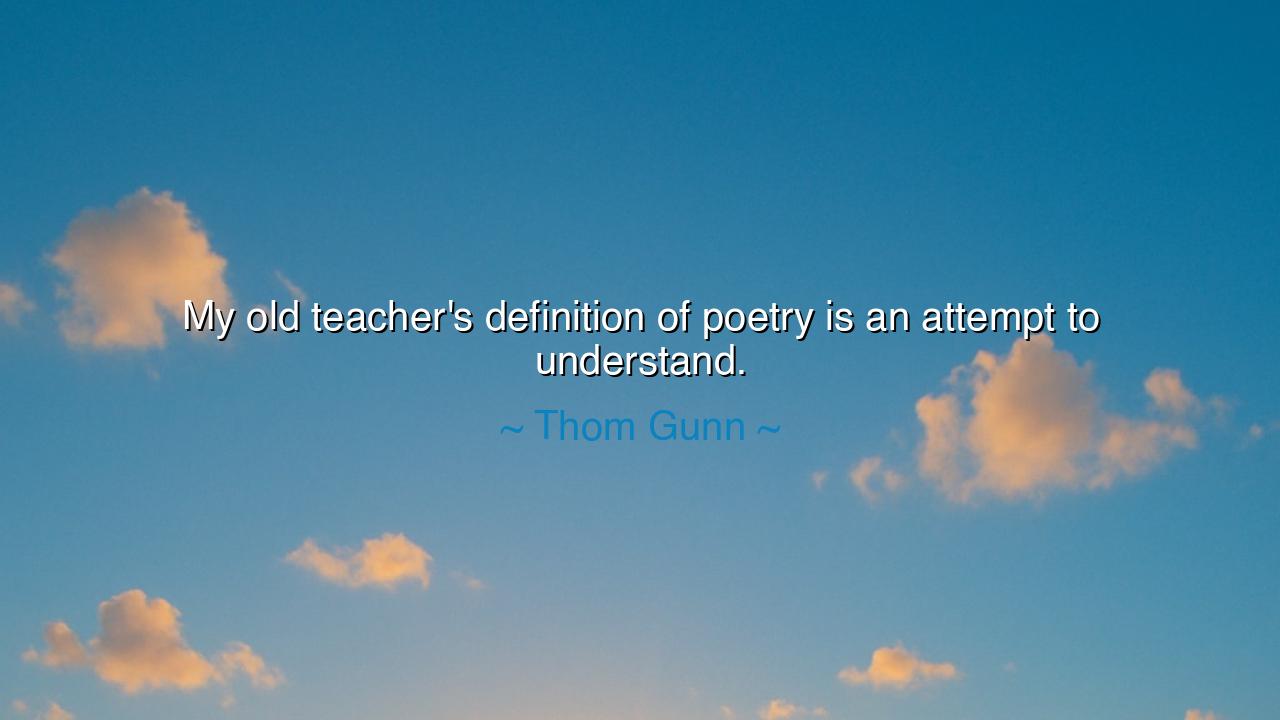
My old teacher's definition of poetry is an attempt to






Thom Gunn once recalled the words of wisdom passed down to him: “My old teacher’s definition of poetry is an attempt to understand.” This saying, though simple in its form, is profound in its depth. For it declares that poetry is not merely ornament, nor is it only rhythm and rhyme—it is the soul’s effort to pierce through mystery, to wrestle with the unknown, and to bring forth meaning where silence once reigned.
The meaning of this quote lies in the humble acknowledgment that human beings, though limited, strive endlessly for clarity. Poetry becomes the vessel of that striving. Where reason falters and logic falls short, poetry takes up the burden, weaving words not to dominate truth but to approach it. An “attempt” is not a final answer, but a reaching toward, a gesture of longing. Thus Gunn’s teacher saw poetry not as possession of truth, but as the yearning for it.
The origin of these words rests in the tradition of mentorship. Gunn’s teacher, unnamed yet remembered, offered not a technical definition of poetry but a philosophical one, passing down a torch of understanding that guided his student’s vision. This echoes the ancient bond of teacher and disciple, where wisdom is less about formulas and more about glimpses into the essence of life. In remembering this definition, Gunn honors not only poetry itself but the lineage of thought that shaped him.
History offers us powerful examples of poetry as understanding. Think of Homer, who through his epics sought to understand the nature of honor, war, and fate. His verses were not mere tales of heroes but meditations on human struggle before the gods. Or consider Rumi, whose ecstatic poems reached toward the divine, attempting to grasp what lies beyond human grasp. Neither claimed to hold complete truth, but both sought it with passion, and through their seeking, generations have been enlightened.
This definition also reminds us of the humility within the poetic act. To call poetry an “attempt” is to admit imperfection. Yet it is in imperfection that beauty often lies. For the attempt itself carries value—the effort to wrestle with grief, to give voice to love, to ask questions of death and eternity. Even if poetry never answers fully, it dignifies the search. In this way, it mirrors life itself, which is less about final answers than about the courage to seek meaning in the midst of uncertainty.
The lesson, then, is that we too must embrace the poetic spirit in our lives. Do not demand that every question be answered; instead, allow yourself to dwell in the attempt, to search, to wonder. Whether you write verses or not, live poetically: seek to understand the people around you, the mysteries of your own heart, and the beauty of the world. For in seeking understanding, you grow closer to truth, even if you never fully grasp it.
Practically, this means practicing reflection. Keep a journal not only of events but of thoughts and questions. Read poetry not to analyze its structure alone but to feel its striving. When faced with suffering or joy, try to articulate it—not necessarily in perfect form, but in honest words. In doing so, you follow the same path Gunn’s teacher described: the path of attempting to understand through language.
So let us remember this teaching: poetry is an attempt to understand. It is the reaching hand, the open heart, the restless mind seeking meaning. We may never capture truth in its entirety, but through poetry we honor the quest. And in honoring the quest, we honor life itself.






AAdministratorAdministrator
Welcome, honored guests. Please leave a comment, we will respond soon